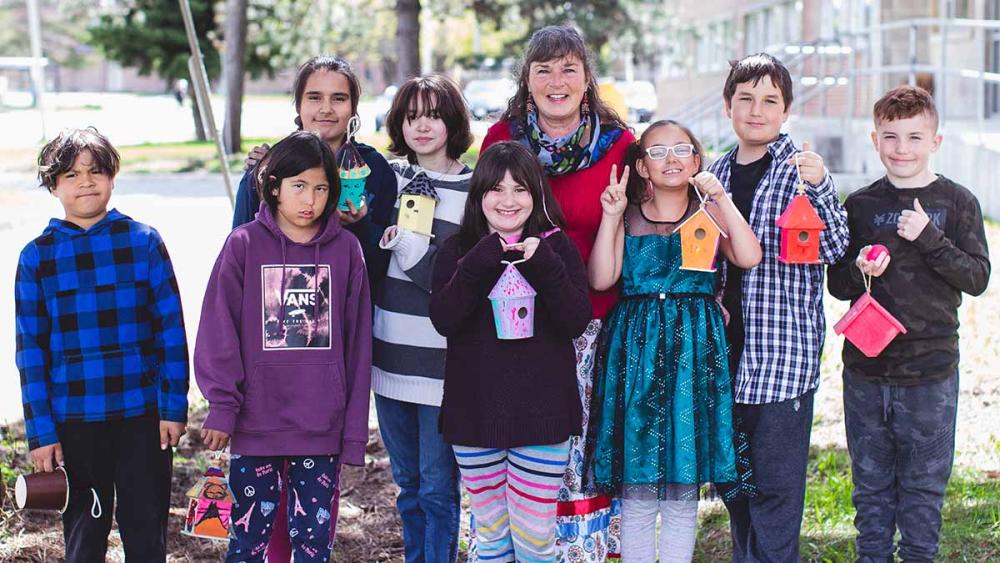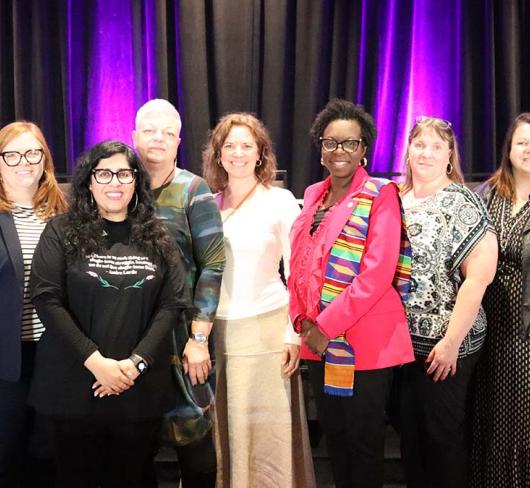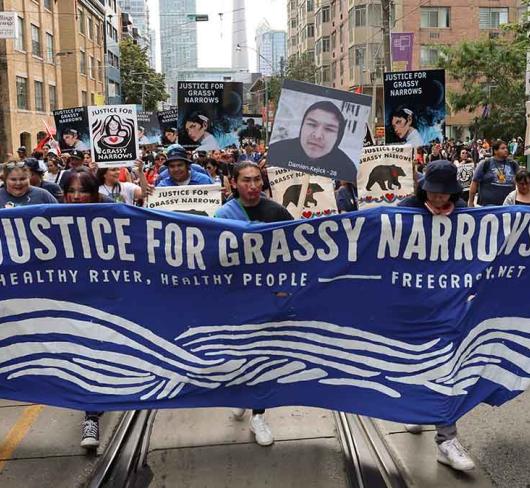
If Not Me, Then Who?
I did not set out to be a leader, but each time an opportunity came my way, I thought: If not me, then who? Who are the Indigenous role models? Whose shoulder can I tap to ensure that we have future role models? How can I help other women succeed in leadership? Our young people are watching, and I wanted to be the best possible role model for my sons and for future leaders. Like wolves, the best leaders put the pack ahead of themselves and prepare a path for the humble ones to take the lead.
I was born a teacher, not a leader. I am the first-born child from the sacred waters of Charlotte St Amant, who is Ojibwe from Henvey Inlet First Nation. My father was Métis from Penetanguishene. His side of the family were originally Drummond Islanders. My siblings and I were brought up speaking French, English and Michif (we did not know it was the language of the Métis, we just thought it was “Penetang French.”)
My mom was and still is the best role model of a strong, Indigenous woman. When she was in her mid-twenties, our family of six moved to France for my dad’s job. While we were there, my parents decided to join the local bridge club as they had seen an ad in the paper: “À la recherche de joueurs de bridge!” The first week, the men didn’t seem to mind my mom’s presence because my parents did not win. The second week, they did win. The men wanted her out of the club, stating that “joueurs” means “masculine players.” But the devil is in the details! Joueurs is masculine plural but can also denote a mixed group. Mom used this technicality to rally all the French women she had met to join her at the bridge club. They were mostly well-educated housewives (this was 1970). By the end of our year in France, the bridge club had seven women members.
Next, we moved to England for five years. It was our first-time attending school in English as we had always been in francophone schools. My brothers, sister and I all developed somewhat British accents. When we moved back to Penetang, I tried hard to lose the accent because I didn’t like the attention it brought me. Friends poked fun that we left Canada as French-speaking Indians (that’s what we called ourselves back then) and came back as Brits.
I was the first person in my family to attend university. I didn’t want to do that either. I chose Western (formerly University of Western Ontario) because, when we moved back to Canada, my dad took a job in London while my mom and the rest of us (four teenagers!) stayed in Penetanguishene. I figured I could stay with Dad and go home with him on weekends. My mom decided the whole family would move to London. My first day at Western, I missed the city bus. My mom drove me to the building for my first class. I cried and did not want to leave the car. I was certain that people would find out I was an “Indian” and shouldn’t be in university. Seat belts had just become mandatory. My mom unclicked our belts, reached past me and opened my door, swung her legs up onto the bench seat and kicked me out with both of her feet. Apparently, I had momentarily forgotten that I come from strong women ancestors.
As it turns out, I was able to finish a degree and then moved to Ottawa to study translation, then to Queen’s for teachers’ college.
At the turn of the century, I was merrily teaching, minding my own business, when out of the blue I was asked to participate in a focus group for Indigenous women educators. I had self-identified and someone in Equity and Women’s Services (EWS) at ETFO got it touch with me.
I went off to Toronto to attend the group, fully expecting to meet my cousins, who were the only other Indigenous teachers that I knew at the time. Surprisingly, none of them were there! (Fun fact: Indigenous peoples still make up only 1 per cent of the teaching population.)
One of the questions we were asked was about union involvement. Oh, I attended Federation dinners and walked picket lines, but I did not see myself in the union. I was certain that it was a place for white people. Why would I get involved? Did I know that ETFO had an Aboriginal (the term used at the time) Education Standing Committee, and would I like to shadow it? No pressure, just attend meetings. So, I did. What a slippery slope that was!
First shadowing the committee, then joining, then chairing, then chairing the joint equity committees, then equity workshop training. What? Now they wanted me to present workshops. The people in EWS focused on building the relationship with me and encouraged me all along to try leadership roles that had never been part of my dreams. (You’d almost think they were Indigenous.) The first time I presented for ETFO was at …and still we Rise. I had registered for the conference and was looking forward to it. Then I got a call asking me if I would co-present the equity workshop. “I can’t present the equity workshop; I signed up to attend that one because there is always so much more to learn.” After some convincing and reassurance that the other two were seasoned presenters, I agreed. From there, it is all history. Picture me presenting equity workshops, Indigenous education workshops, anti-homophobia workshops, anti-racism workshops – all so unexpected because I am a very shy person.
Next came curriculum writing. I was invited and encouraged to join equity writing teams. That part was easy, as I had been teaching French for a long time and was constantly writing or translating curriculum.
While all this was happening, I was also thinking ahead and thought I would like to do art therapy in retirement. From 2004 to 2006, I was a full-time student at the Toronto Art Therapy Institute (TATI), I was teaching 3 days a week (60 per cent), a full-time single parent, and travelling to every corner of the province providing equity workshops.
In 2004, EWS began a new course called Leaders for Tomorrow (L4T). I really wanted to take the course and even approached the TATI director in the hopes that none of the course weekends overlapped. It was not to be for that year; however, I was invited to open the first session and close the last session of L4T and got to meet all the fabulous leaders and teachers of the course.
At Annual Meeting in 2005, the equity-seeking groups were again putting forward a motion to have equity seats on the provincial executive. I had been asked to run for the Indigenous seat if the motion went through. I had also been told that if I ran for election that year and got elected, then I could not take the L4T course. I really wanted to take the course. So, I asked another Indigenous person if she would run, and offered to be her campaign manager. Annual Meeting saw me arrive with my laptop, printer, coloured paper, scissors, markers, camera, glue…everything we might need to help run a strong campaign. The motion was defeated but we used the materials to help a recent L4T grad successfully run from the floor.
I enrolled for the second year of L4T. Leaders for Tomorrow is a course to encourage Indigenous women and women from equity-seeking groups to take on leadership roles. It was, by far, the best professional development I have ever taken! It helped me see myself as a leader and gave me the confidence and a circle of strong women to motivate me to move forward in leadership.
Each August, I enjoyed attending Annual Meeting because I would meet interesting people, many of whom helped me along the way. One of them was an occasional teacher president. Together we crafted a motion on campaign training for designated groups, which passed. Every second year, there was a training session offered. I was one of the participants in the first training session. That is where I met the person who would go on to be a good friend and my campaign manager for two successful campaigns for an Executive position.
With the help of several people who were running for election or re-election in 2007, I was mentored and guided. Financial support to help run the campaign came from many individuals and locals. In 2007, I was neither a delegate nor an alternate at Annual Meeting. I was, however, the chair of the Indigenous Standing Committee which allowed me to speak to motions if I were the mover. When I first walked to the microphone, I knew I was allowed to speak and insisted on doing so.
I was the first Indigenous person to be elected to the provincial Executive and the only person ever to be elected who was neither an alternate nor delegate at Annual Meeting. Moments after the election results were in, I stepped out of the room to call home with the news. A prominent member of my local came over to congratulate me but also added, “You will never get re-elected. You are just a novelty!” Right then and there I decided that even if this somehow turned out to be the worst two years of my life, I would run again to show him that I was not a novelty. Serving ETFO educators for four years while also teaching full time was not easy, but I persevered.
After 30 years of teaching, I retired to spend time with my dad while he was still on his earth journey and to offer respite for my mom. Since retirement, I have written a book, called First Nations, Métis, and Inuit Student Success (yes, I know there is a Ministry of Education document with the same name.) I started an Indigenous education consulting business, became involved with the Kingston Indigenous Languages Nest (KILN) and began learning Anishinaabemowin (Ojibwe) and Kanien’keha (Mohawk), which are my sixth and seventh languages.
Since 2017, I have been the first Elderin-Residence at the faculty of education at Queen’s University. I still visit schools and offer cultural experiences and guidance.
Leadership opportunities came because others believed in, encouraged and mentored me. I am the product of the dreams of people within ETFO who wanted to see more diverse faces at the decision-making table and who hoisted me onto the shoulders of my ancestors.
ETFO offers many opportunities for educators and has specific budget lines to provide professional development for women. It is important that women’s voices be heard and raised. Even if you are shy, try something new: attend a workshop or conference, join a standing committee or writing team. Bring a friend with you. Ask yourself: “If not me, then who?” Together, we can all help each other in carrying on the legacy of strong women leaders within ETFO.
In Ojibwe we have the word “miigwech,” which is used for “thanks” but really speaks to giving back and being in reciprocal relationships. I was helped and I helped back by serving you, the members. That is my miigwech.
Deb St Amant (Bezhig Waabshke Ma’iingan Gewetigaaboo) is an honorary life member of ETFO.

